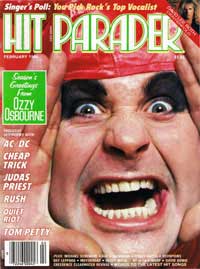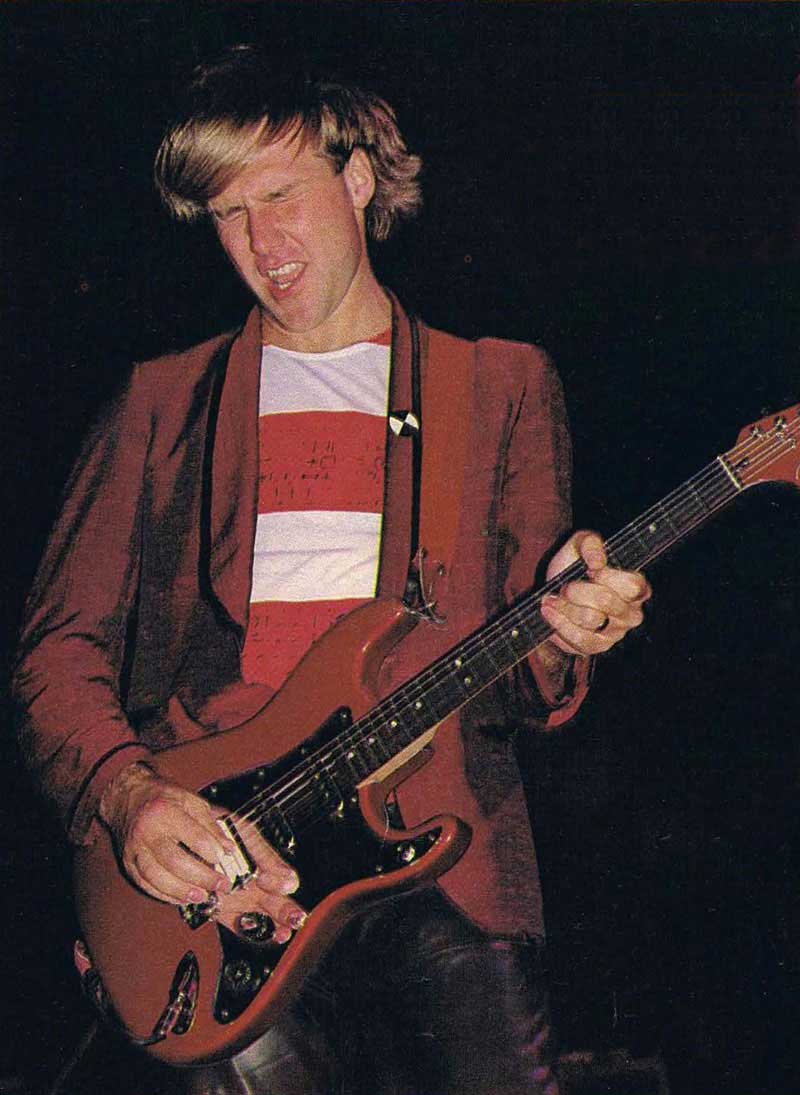The Three Musketeers
Legendary Trio Complete New Album And Prepare For International Tour
By Kerry Doole, Hit Parader, February 1984, transcribed by pwrwindows

Geddy Lee looked as though he'd just pitched nine innings of his beloved baseball. Rush was nearing the end of a major European tour when we caught up with the band in the cavernous bowels of Wembley Arena, the London venue reserved for the upper echelons of the rock hierarchy.
It is a measure of Lee's class and dedication to his craft that at the gig's conclusion he found time for serious discussions on the choice of producer for the next Rush opus, another lengthy interview with yet another rock scribe, and then a chat with a couple of young Canuck fans who had crossed the Atlantic just for this chance to rub shoulders with their heroes.
Selling out Wembley for four straight nights is reason enough for anyone to wear a smug, self-satisfied smile, but Geddy Lee's mind was already on the next album, scheduled for early 1984 release.
"All we're doing is thinking about the next project! We're still trying to sort out what we want to do. Signals was a transitional album for us. We were groping in the dark. It was about expanding the horizons of the band and the sound, and the next album will be a little closer to what we were really pointing to on Signals."
It is this penchant for progression, this commitment to change, that sets Rush apart from the heavy-metal mainstream, and the new album should further sever any ties to that genre. Most bands that have survived a decade in the crazy rock and roll zoo are content to crank out facsimiles of the sound that brought them success, but Rush is made of sterner stuff.

"We've never made a blueprint," claimed Geddy. "We really don't know what the next album will sound like until we've gone in and written the material. We write the material and whatever comes out dictates what the sound of the next LP will be. We try for it to be very natural. We lock ourselves up and see what comes out. It's a natural evolution."
'Locking ourselves up' in Rush's case means taking off to the Great White (cottage country) North near their Toronto homes where they can write and rehearse without the distractions of city life. Easier to play baseball up there too! Next stop is Montreal's famed Le Studio, but at presstime the identity of the new Rush producer was still unknown. Initial reports had mentioned English studio whiz-kid Steve Lillywhite (XTC, Joan Armatrading, U2), but that didn't work out. The fact that he was even considered indicates that the more adventurous, contemporary sound permeating Signals is to be continued.
Going back into the studio is an annual ritual for Rush now, and it no longer fills Geddy Lee with dread. "I've been worried that the creative juices will dry up ever since I wrote my first song. I thought then, 'That's it! That'll be the last thing I write!' But you get confidence as you go along. We know we can go in and write a record. We don't know how good it's going to be, but we know something is going to emerge because we've done it 10 times before.
"It's not until it's all said and done that you can look back and see how good it is. That's a drawback in being part of a band. You're really excited when you go into a studio, but by the time you've finished, you don't know what you've done anymore. It's not until six months later that you can really hear a record."
Looking back, Lee admitted to mixed feelings about Signals, an album that did indeed signal a changing Rush sound, even producing a once unthinkable byproduct, a hit single, "New World Man". "I was very positive about the direction of Signals, but I wasn't sure if we hit the mark because it was new, and we were putting ourselves into a different area. Now, with this much time gone by, I think there are moments when we got what we wanted, and others where we obviously were in a transitory state."

Only once did Rush ever feel completely satisfied with an album. "When we did Caress Of Steel, we thought it was the most wonderful record anyone could ever make, but it was our least successful. It was our third, and, after a few months, listening back we all thought 'what a weird record,' and it was!
"It was another transitory record, with lots of experimentation, just like Signals. After Caress Of Steel we did 2112, which was a very solid, positive record. We were very pleased with it, but I don't think we could have made it without the album before. All those steps are necessary to help you arrive at a certain point. The way our band works is like that; we go through phases of experimenting, then locking in on something."
For Lee, listening to the early Rush albums is "like looking at your drawings from Grade 6; you can appreciate where you were at the time, but you also see the naïveté."
The members of Rush have talked for some time about making records outside of the band. Nothing concrete has yet emerged, but the desire remains. "Being in the same band for so long, you miss out on the education of playing with others. I would like to make a record with a bunch of people. Not a 'Geddy Lee Solo Record' - just another record with different musicians. The reason we've never had a major urge to get something out on a solo record is that we're not frustrated. Many bands feel they have to do solo LPs because a lot of their ideas aren't being used. They feel their own identity is being swallowed up by the band, but we feel our identity is the band!"
Despite a Rush work schedule that would have weaker souls reaching for the Valium or Benzedrine, Geddy Lee recently found time to produce the debut album of promising Toronto group Boys Brigade, a project he found stimulating.
"Aside from the fact that I love the band and they're a great bunch of young musicians, the main reason for accepting the project was to put myself in a position I'm not expected to be in. I don't want to be restricted or pigeonholed to producing just heavy rock groups." The outside interests of individual Rush members should not be viewed as threats to the future of the band, simply because the three guys get along so well together, both personally and professionally. Still friendly after all these years, Geddy Lee described being in Rush as "more than being married. I spend more time with the guys in the band than with my wife. It's ridiculous! The amazing thing is that we're still not sick of each other."